The event held on 13th November was chaired by Professor Neil Mitchell (International Relations, UCL) and hosted by the Amnesty International society at University of College London University (UCLU).
Criticising the conduct of the Sri Lankan state over the past three years, Alan Keenan of the ICG described the government’s killing of civilians as “not accidental”. The “machine” the Sri Lankan government used to fight the LTTE said Keenan, “what we might call state terror” has been “actively chugging along since the end of the war.” He continued, “the hope was that with the end of the war, the apparatus to destroy dissent would be put away or could be slowly cranked down. Unfortunately it hasn’t.”
 |
| Left to right: Thusiyan Nandakumar – TYOUK, Fred Carver – Sri Lanka Campaign, Prof Neil Mitchell – chair, Madurika Rasaratnam – TAG and Alan Keenan – ICG. |
Following on from Keenan, Madurika Rasaratnam of TAG argued that the current issues highlighted were “not a departure from the norm, but rather a development of Sinhala Buddhist state formation”.
She continued,
“The idea of genocide is useful to understand the past, the present and the future of Sri Lanka. The label of genocide captures the process that has occurred in the post-independence Sri Lanka. If you look at post-2009 and the policies that were in place in the 60s and 70s there is absolute continuity.”
Highlighting the “Sinhala Buddhist transformation of state, society and economy”, as well as an ongoing process of colonisation, and militarisation of the North-East, Rasaratnam argued that “fixing Sri Lanka needs to be understood in terms of confronting the entrenched Sri Lankan Buddhist idealogy [and] affirming that Tamils have a right to exist as a nation, with a right to self-determination.”

“Why is the Sri Lankan state committing human rights violations? It’s not because it is a human rights violator per se, but because it is a means to an end [Sinhala Buddhist state formation]”
“Militarisation cannot be understood except as part of this rolling process of state formation”.
As to whether the size of Sri Lanka’s massive all-Sinhala military reflects a response to unemployment, Rasaratnam pointed out that Sri Lanka’s actions differed significantly from other conflicted states with unemployment. Nigeria, for example, “did not increase their miliary, and presumably they too have issues with unemployment.”

